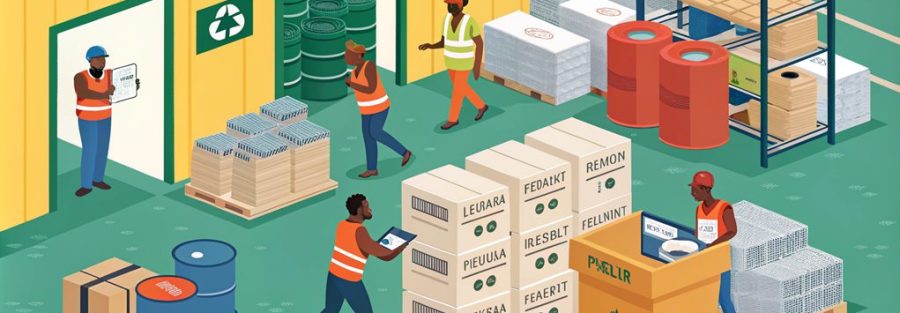At Novatia Consulting, we understand that implementing an effective reverse logistics strategy in Nigeria can significantly enhance business operations. By prioritizing processes such as refurbishing and recycling, we not only promote sustainability but also align with the increasing expectations of consumers. Our strategy involves a thorough analysis of critical metrics and the adoption of advanced technology to efficiently track returns. This approach not only minimizes costs but also elevates customer satisfaction by providing a seamless return experience. As we navigate the challenges and opportunities within this sector, our comprehensive reverse logistics strategy prepares businesses to meet future demands. Discover how we can help you optimize your reverse logistics efforts in Nigeria.
Key Takeaways
- Enhancing Customer Satisfaction Through Clear Return Policies in Reverse Logistics Strategy in Nigeria: Implement clear return policies to enhance customer satisfaction and streamline the reverse logistics process in Nigeria.
- Leveraging Technology for Efficient Inventory Management in Reverse Logistics Strategy in Nigeria: Invest in technology for tracking returns, improving inventory management, and providing real-time data access.
- Building Partnerships for Effective Return Management in Reverse Logistics Strategy in Nigeria: Foster partnerships with suppliers and logistics providers to ensure effective return management and operational efficiency.
- Adapting Reverse Logistics Strategies Based on Customer Feedback in Nigeria: Regularly review and adapt reverse logistics strategies based on customer feedback and changing market trends.
- Promoting Recycling Initiatives to Support Sustainability in Reverse Logistics Strategy in Nigeria: Promote recycling initiatives to engage consumers and support sustainability efforts within the community.
Understanding Reverse Logistics
Understanding Reverse Logistics: A Vital Component of Supply Chain Management in Nigeria
In recent years, there's been an increasing acknowledgment of reverse logistics as a pivotal element of supply chain management, particularly within Nigeria's dynamic market landscape. Understanding the fundamentals of reverse logistics is crucial for businesses aiming to optimize their logistics networks effectively. At its essence, reverse logistics encompasses the process of transporting goods from their final destination back to the manufacturer or distributor for the purpose of recapturing value or ensuring proper disposal.
To fully appreciate the strategic significance of reverse logistics, we must analyze its impact on enhancing operational efficiency and sustainability. By integrating reverse logistics into our logistics networks, we can effectively reduce waste, lower costs, and boost customer satisfaction. This comprehensive approach not only addresses the return of defective or unwanted products but also includes refurbishing, recycling, and responsible disposal—practices that are increasingly critical in a market where environmental considerations are of utmost importance.
Moreover, the application of technology to streamline reverse logistics processes can yield substantial improvements. Through the implementation of robust tracking systems and data analytics, we can derive insights into return patterns, allowing us to pinpoint opportunities to minimize returns and enhance product quality.
In a competitive environment like Nigeria's, where consumer expectations continue to escalate, a deep understanding of reverse logistics intricacies becomes a significant competitive advantage. As we navigate this evolving market landscape, it is essential to not only comprehend these reverse logistics fundamentals but also to actively integrate them into our broader supply chain strategy. This proactive stance will ultimately pave the way for sustained success in the future.
Importance in Nigeria
The Crucial Role of Reverse Logistics in Enhancing Supply Chain Efficiency in Nigeria
The significance of reverse logistics in Nigeria is pivotal, acting as a cornerstone for augmenting operational efficiency and sustainability within supply chains. By implementing effective reverse logistics strategies, businesses can significantly enhance their inventory management, leading to a reduction in excess stock and an optimization of inventory turnover rates. This advancement not only results in cost savings but also aligns with current market trends that emphasize eco-friendly practices.
In today's landscape, evaluating the environmental ramifications of our operations is vital. Efficient reverse logistics minimizes waste and encourages recycling, aligning with the increasing consumer preference for sustainable options. As public awareness of environmental issues rises, companies that incorporate comprehensive reverse logistics strategies can enhance brand loyalty and improve service quality.
In Nigeria, the optimization of logistics is essential for navigating the complexities inherent in our supply chains. By refining return processes and ensuring the adept handling of returned goods, businesses can elevate their operational efficiency. This enhancement directly correlates with increased customer satisfaction, as consumers value a hassle-free return experience.
Moreover, by scrutinizing market trends, we can uncover opportunities to refine reverse logistics processes that meet consumer demands while simultaneously driving profitability. In conclusion, the adoption of reverse logistics in Nigeria presents a multifaceted approach to bolstering supply chain performance, yielding significant cost savings, nurturing brand loyalty, and positively impacting both operational efficiency and environmental sustainability.
Key Components of Strategy
A well-defined reverse logistics strategy is crucial for businesses aiming to enhance their supply chain operations in Nigeria. To achieve this, we must concentrate on several key components that will elevate our efficiency and effectiveness in managing returns and recycling processes.
First, we need to identify key metrics that will enable us to assess our reverse logistics performance. These metrics might encompass return rates, processing times, and cost per return. By establishing a clear set of key metrics, we can pinpoint areas for improvement and set achievable targets that propel our operations forward.
Next, we must ensure strategic coherence across all departments involved in the reverse logistics process. This entails integrating our logistics, customer service, and sales teams to foster a unified approach to handling returns. When all departments are aligned, we can streamline processes and mitigate inefficiencies that may hinder our operations.
Additionally, we should invest in technology that bolsters our reverse logistics strategy. Implementing software solutions for tracking returns and managing inventory can provide us with real-time data, further facilitating our strategic coherence.
Lastly, we need to cultivate strong partnerships with suppliers and logistics providers. Collaborating closely with these stakeholders can enhance our capacity to manage returns effectively and establish a sustainable reverse logistics framework.
Together, these components constitute the foundation of a successful reverse logistics strategy in Nigeria, leading to improved operational efficiency and heightened customer satisfaction.
Challenges in Implementation
Implementing a Reverse Logistics Strategy in Nigeria: Navigating Key Challenges
Implementing a reverse logistics strategy in Nigeria presents several significant challenges. One of the foremost barriers to adoption is the lack of consumer awareness. Many customers are not familiar with return policies or the advantages of recycling, which results in low participation rates in reverse logistics programs. This knowledge gap not only hinders consumer involvement but also leads to operational inefficiencies within our supply chain.
Additionally, technology integration poses another critical challenge. The absence of modern systems to track returns and manage inventory often leaves us with fragmented processes that impede efficiency. This situation can result in increased costs and delays, complicating our operational landscape further.
Furthermore, we need to address the training requirements of our workforce. Our teams require comprehensive training to manage reverse logistics effectively. Without adequate education, employees may find it difficult to handle returns, potentially resulting in errors and increased frustrations for both staff and customers.
Lastly, we must consider the broader impacts on the supply chain. Implementing a reverse logistics strategy requires seamless coordination among multiple stakeholders, including suppliers and logistics partners. Ineffective management of these relationships can lead to a disjointed process, ultimately undermining our efforts.
As we confront these challenges, we must remain dedicated to identifying solutions that enhance our reverse logistics strategy, transforming obstacles into opportunities for growth and improvement.
Benefits for Businesses
Unlocking Business Potential Through Effective Reverse Logistics in Nigeria
As we navigate the complexities of reverse logistics in Nigeria, adopting this strategy can bring substantial advantages to our businesses. A well-executed reverse logistics strategy can lead to significant cost savings by optimizing our return processes and minimizing waste. By effectively managing product returns, we can lower the expenses tied to excess inventory and enhance our overall operational efficiency.
Additionally, optimizing our supply chain through reverse logistics enables us to extend the product lifecycle. This approach allows for the refurbishment, repair, or recycling of products, which not only curtails costs but also positively impacts the environment. As sustainability becomes increasingly important, customers are gravitating towards businesses that prioritize eco-friendly practices, thereby enhancing customer satisfaction and loyalty.
Strategic partnerships play a crucial role in this context. Collaborating with third-party logistics providers or recycling firms can elevate our inventory management capabilities, ensuring that returned goods are handled more proficiently. These partnerships offer the expertise and resources necessary to refine our reverse logistics processes, allowing us to concentrate on our core competencies.
Ultimately, integrating reverse logistics into our business strategy transcends mere return management; it transforms returns into valuable opportunities. This proactive approach enables us to differentiate ourselves in the market, forge stronger customer relationships, and drive growth. In a competitive landscape, harnessing the power of reverse logistics is vital for maintaining our competitive edge and securing long-term success.
Customer Return Policies
Establishing Clear and Customer-Friendly Return Policies for Business Success in Nigeria
Establishing clear and customer-friendly return policies is essential for businesses aiming to thrive in Nigeria's dynamic market. In our experience, effective return policies not only improve customer satisfaction but also streamline return efficiency. When customers know what to expect, they're more likely to make purchases, confident that their concerns will be addressed.
First, we need to outline a straightforward process for returns, making it easy for customers to understand their options. This includes specifying the time frame for returns, acceptable conditions for items, and any required documentation. By providing a detailed return policy, we eliminate confusion and foster trust, promoting a positive customer experience.
Next, we should consider the impact of technology on our return processes. Implementing an online return portal can greatly improve return efficiency. Customers can initiate returns digitally, track their status, and receive timely updates, all of which contribute to a seamless experience. By optimizing technology, we're not just improving logistics; we're also showing our commitment to customer satisfaction.
Moreover, we must regularly review and adapt these policies based on customer feedback and market trends. Engaging with our customers and understanding their needs will allow us to refine our return strategies, ensuring they correspond with expectations.
Recycling and Waste Management
As we navigate the complexities of reverse logistics in Nigeria, addressing recycling and waste management emerges as an essential strategy for sustainability and operational efficiency. Implementing effective recycling initiatives can significantly contribute to waste reduction and material recovery, ultimately guiding us toward environmental sustainability. By prioritizing eco-friendly practices, we can enhance resource optimization, ensuring that valuable materials are reused rather than sent to landfills.
Public involvement is crucial in this endeavor. By raising consumer awareness about the importance of recycling, we can foster a culture that values responsible waste disposal. This shift is vital for successful landfill diversion strategies, which aim to minimize waste accumulation in landfills through proactive recycling efforts. Moreover, we must advocate for robust policy enforcement that supports recycling initiatives and incentivizes businesses to adopt sustainable practices.
Strategically, collaboration with local governments and organizations is essential to develop comprehensive waste management frameworks. These frameworks should facilitate recycling and integrate education and outreach programs that empower communities. Engaging the public in these discussions fosters a sense of responsibility and collective ownership of our environment, ultimately leading to more effective recycling and waste management practices.
Technology's Role
The Role of Technology in Transforming Reverse Logistics in Nigeria
The integration of technology in reverse logistics is proving to be a game changer in Nigeria's waste management and recycling efforts. By adopting automation tools, we can streamline processes, greatly reducing labor costs and human error. Implementing sophisticated software solutions enables us to manage inventory effectively, guaranteeing that materials are recycled or reused promptly, which directly supports our sustainability goals.
Data analytics plays an essential role in understanding patterns and trends in waste generation, allowing us to make informed decisions. By analyzing this data, we can optimize our delivery networks, ensuring that resources are allocated efficiently. Tracking systems provide us with real-time monitoring capabilities, improving our ability to manage returns and keep customers informed about their products' journey.
Furthermore, effective customer involvement is crucial in this sector. We can leverage technology to create interactive platforms where customers can easily return products, track their recycling status, and receive feedback on their contributions to sustainability. This not only fosters loyalty but also drives greater participation in recycling initiatives.
Process optimization through these technological advancements leads to improved supply chain integration, which is essential for a cohesive reverse logistics framework. By connecting various stakeholders—from manufacturers to consumers—we can guarantee a seamless flow of materials back into the production cycle. Overall, the strategic application of technology in reverse logistics can improve efficiency, reduce waste, and promote a circular economy in Nigeria, driving us toward a more sustainable future.
Case Studies in Nigeria
Several notable case studies in Nigeria underscore the effectiveness of reverse logistics strategies, illustrating how businesses are adapting to enhance sustainability and operational efficiency. One significant case study features a leading consumer electronics company that overhauled its supply chain by implementing a structured reverse logistics framework. This initiative not only minimized waste but also maximized resource recovery throughout the product lifecycle. By establishing collection points and actively engaging local communities, the company successfully motivated consumers to return end-of-life products, ultimately improving their environmental footprint.
Another compelling case study involves a textile manufacturer that grappled with overstock inventory challenges. By adopting a reverse logistics system, they created a redistribution channel for unsold garments. This approach not only mitigated losses but also promoted a circular economy, extending the products' lifecycle through donations and recycling initiatives. As a result, the company reported enhanced brand loyalty, as consumers increasingly prioritize sustainability.
Additionally, a prominent beverage firm exemplified how effective reverse logistics can optimize their supply chain. They launched a bottle return program, incentivizing customers to return empty bottles for recycling. This initiative not only advanced their sustainability objectives but also streamlined production costs by ensuring that raw materials were reused, significantly reducing environmental impact.
In each of these case studies, it is evident that the strategic implementation of reverse logistics not only boosts operational efficiency but also fosters sustainable practices. As more companies in Nigeria embrace similar strategies, we are likely to witness a substantial transformation in the perception of reverse logistics within the wider supply chain landscape.
Measuring Success
Measuring Success in Reverse Logistics: Key Performance Indicators for Businesses in Nigeria
Measuring success in reverse logistics requires a thorough approach that incorporates various key performance indicators (KPIs) tailored to the specific goals of a business. To effectively assess our reverse logistics strategy in Nigeria, we need to establish clear success metrics that correspond with our operational objectives. These metrics will help us track efficiency and identify areas for improvement.
One significant performance indicator is the return rate of products. By analyzing how many items are returned versus the total sold, we can gauge customer satisfaction and the effectiveness of our product quality. Additionally, we should monitor the time taken to process returns; a shorter processing time not only improves the customer experience but also reduces operational costs.
Another vital metric for measuring success is the cost associated with reverse logistics activities. This includes transportation, handling, and refurbishment costs. By keeping these expenses under control, we can directly impact our profitability. We should also consider measuring the percentage of returned items that are successfully resold. This not only reflects our recovery efficiency but also highlights our commitment to sustainability.
Lastly, customer feedback should be integrated into our performance indicators. Understanding customer perceptions can provide valuable insights that drive strategic adjustments. By leveraging these success metrics and performance indicators, we'll be well-equipped to assess our reverse logistics efforts, ensuring they contribute positively to our overall business strategy in Nigeria.
Best Practices
Optimizing Return Logistics: Best Practices for Reverse Logistics in Nigeria
Implementing a robust reverse logistics strategy in Nigeria requires adopting best practices that streamline our processes and enhance overall efficiency. One key aspect is optimizing our return logistics operations. By analyzing return patterns and understanding customer behavior, we can effectively reduce unnecessary returns and elevate customer satisfaction. This involves leveraging data analytics to identify the root causes of returns and proactively addressing them.
Integrating Sustainability in Reverse Logistics: Best Practices for a Greener Future
Another vital best practice is the integration of sustainable practices into our reverse logistics framework. Aligning with global sustainability goals not only meets the expectations of eco-conscious consumers but also enhances our brand reputation. We should prioritize refurbishing and recycling returned products to minimize waste and conserve resources. Establishing partnerships with local recyclers can significantly bolster our sustainability efforts while fostering community engagement.
Enhancing Visibility in Return Logistics: Best Practices for Efficient Tracking
Utilizing technology to enhance visibility in our return logistics is crucial. Implementing a centralized system that tracks returned items in real time can improve inventory management and reduce lead times. Moreover, automating our return processes can streamline operations, enabling us to focus on strategic decision-making rather than getting bogged down with manual tasks.
Investing in Workforce Development: Best Practices for Excellence in Reverse Logistics
Lastly, continuous training and development of our workforce are essential components of a successful reverse logistics strategy. By investing in our team's knowledge of best practices related to return logistics and sustainable methods, we can cultivate a culture of excellence that propels our reverse logistics strategy forward. Embracing these best practices will not only enhance our operational efficiency but also solidify our competitive position in the Nigerian market.
Collaboration With Stakeholders
To effectively navigate the complexities of reverse logistics in Nigeria, collaboration with stakeholders is paramount. The success of our reverse logistics strategy is contingent upon strong involvement from all relevant parties, including manufacturers, retailers, logistics providers, and consumers. By establishing clear lines of communication, we can ensure that everyone is aligned and understands their roles within the reverse supply chain process.
Our strategy should incorporate partnership frameworks that promote mutual benefits. These frameworks must delineate shared goals, responsibilities, and performance metrics. For example, logistics providers can utilize their expertise to enhance the return process, while manufacturers can concentrate on optimizing product recovery and refurbishment. Through close collaboration, we can reduce waste and enhance resource efficiency, which is particularly vital in Nigeria's resource-constrained landscape.
Furthermore, engaging consumers in our reverse logistics initiatives is crucial. Their insights can significantly improve our processes and inform our understanding of return behaviors, leading to more effective return policies. Involving stakeholders in this way not only fosters trust but also enhances the overall customer experience.
As we navigate the distinct challenges of reverse logistics in Nigeria, let us commit to cultivating a collaborative ecosystem. By working together, we can devise innovative solutions that tackle logistical inefficiencies and contribute to a more sustainable circular economy. Ultimately, our collective efforts will establish a more resilient reverse logistics framework that benefits all stakeholders involved.
Regulatory Considerations
As we enhance our collaborative frameworks with stakeholders, it's crucial to consider the regulatory considerations surrounding reverse logistics in Nigeria. Understanding the complexities of regulatory compliance is vital for ensuring that our reverse logistics strategies are not only efficient but also legally compliant. In Nigeria, multiple regulations impact how products are returned, recycled, and disposed of, highlighting the necessity for companies to remain informed and adaptable.
We should focus particularly on the environmental standards established by the National Environmental Standards and Regulations Enforcement Agency (NESREA). These standards dictate waste management protocols and underscore the significance of sustainable practices within reverse logistics. By aligning our strategies with these regulations, we mitigate the risk of penalties while simultaneously enhancing our corporate image and positively contributing to the environment.
Furthermore, as we navigate these regulatory considerations, we must also take into account the implications of international agreements and local laws that may affect our operations. Collaborating with legal experts and regulatory bodies will better equip us to understand the dynamic landscape and prepare for potential changes.
Future Trends
Looking Ahead: Transforming Reverse Logistics in Nigeria
As we look to the future, the landscape of reverse logistics in Nigeria is set for significant transformation, driven by technological advancements and shifting consumer expectations. Analyzing emerging trends reveals that integrating sustainable practices into reverse logistics is becoming not just a choice, but a necessity. Consumers are increasingly aware of their purchasing impact, favoring companies that prioritize environmental responsibility. This shift compels us to rethink traditional logistics frameworks and embrace greener alternatives.
Moreover, we must be attuned to evolving market dynamics. The rise of e-commerce has accelerated the demand for efficient return processes. Companies adept at adapting their reverse logistics to manage increased volumes while maintaining customer satisfaction will secure a competitive edge. Leveraging technology such as tracking systems and data analytics can enhance transparency and streamline operations, enabling us to respond swiftly to the ever-changing market demands.
Furthermore, collaboration between businesses and local governments is essential. By working together, we can cultivate a supportive environment for sustainable practices that benefit not only our organizations but also the community and the planet. As we navigate these future trends, it is crucial to remain strategic and flexible, allowing us to pivot quickly in response to new challenges and opportunities.
Developing an Action Plan
Embracing the Future of Reverse Logistics: Crafting a Comprehensive Action Plan
Embracing the future of reverse logistics requires a well-structured action plan that aligns with the emerging trends we've identified. As we engage in developing this plan, we must focus on actionable insights that guide our decisions and improve our operational efficiency.
First, we should assess our current reverse logistics processes, identifying gaps and areas for enhancement. This diagnostic phase will provide us with a clear understanding of where we stand and the adjustments needed for peak performance in our reverse logistics operations.
Next, we'll set specific, measurable objectives that align with our strategic goals. This alignment is vital; it ensures that every action taken in our reverse logistics strategy contributes meaningfully to our broader business objectives. By mapping out our goals, we can prioritize initiatives that deliver the highest impact within our reverse logistics framework.
Additionally, we should consider the technology and systems necessary to support our action plan. Investing in advanced tracking systems and data analytics tools will enable us to monitor our reverse logistics operations in real-time, allowing for swift adjustments based on performance metrics.
Frequently Asked Questions
What Industries Benefit Most From Reverse Logistics in Nigeria?
When considering the industries that benefit most from reverse logistics in Nigeria, the retail sector emerges as a key player. The adoption of advanced technologies enhances operational efficiency while prioritizing environmental sustainability resonates with today's conscious consumers. By implementing effective reverse logistics strategies, the retail industry can achieve substantial cost reductions and optimize the supply chain. This approach not only enhances profitability but also aligns with broader sustainability objectives, making reverse logistics a strategic imperative for the retail sector.
How Does Reverse Logistics Impact Customer Satisfaction?
When considering how reverse logistics impacts customer satisfaction, it becomes evident that an efficient returns process is crucial. By optimizing returns, we can enhance the overall customer experience significantly. Furthermore, utilizing customer feedback enables us to pinpoint pain points in the returns process, which allows us to implement strategic improvements. Ultimately, emphasizing reverse logistics not only enhances customer satisfaction but also cultivates loyalty, encouraging customers to choose our services again in the future.
What Skills Are Needed for Reverse Logistics Management?
When considering the skills needed for effective reverse logistics management, it is crucial to understand the dynamics of supply chains and waste management strategies. Analytical thinking plays a vital role in optimizing processes, while strong communication skills are essential for coordinating with various stakeholders. Moreover, proficiency in data analysis is necessary to track returns and enhance efficiencies. Strategic planning is fundamental to minimize costs and improve customer satisfaction, ensuring that resources and returns are managed effectively.
How Can Small Businesses Implement Reverse Logistics Effectively?
How Small Businesses Can Implement Reverse Logistics Effectively
To implement reverse logistics effectively, small businesses should prioritize streamlining the return process and enhancing inventory management. Establishing clear return policies can significantly reduce confusion and improve customer satisfaction. By utilizing technology, such as tracking systems, businesses can manage returned items efficiently. Regular analysis of return data enables the identification of trends, allowing for strategic adjustments. Ultimately, these practices can optimize operations and boost profitability while maintaining strong customer relationships.
What Are Common Misconceptions About Reverse Logistics?
Common Misconceptions About Reverse Logistics: Beyond Returns Management
When we think about common misconceptions regarding reverse logistics, we often find that many believe it solely involves returns management. In reality, reverse logistics is an integral part of the entire supply chain, influencing efficiency and cost savings. Another misconception is that reverse logistics only benefits large companies; small businesses can leverage reverse logistics too. By strategically managing returns, we can improve customer satisfaction and boost resource utilization, ultimately driving better performance across our operations.







